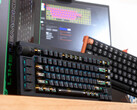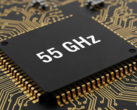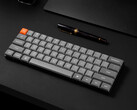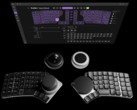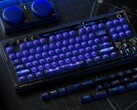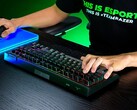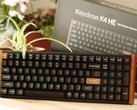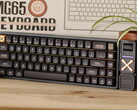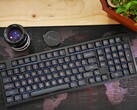The idea of a keyboard powered by solar and ambient light is nothing new. Just this year at CES, Lenovo unveiled the Lenovo Self Charging Bluetooth Keyboard, which still hasn't launched but claims to deliver two years of battery life. The same idea has seemingly started gaining traction in the enthusiast keyboard market, with CannonKeys recently announcing its own solar-charging DIY mechanical keyboard — the Soleil TKL.
The Soleil TKL has not yet fully launched, with CannonKeys initiating the group buy process with an interest check form. The designers are aiming for a Fall group buy, and at a minimum order quantity of 100 units, the Soleil will cost around $450.
Soleil design, specs, and features
The main point of Soleil is to deliver premium build quality and worry-free wireless connectivity. As opposed to regular wireless mechanical keyboards like the Keychron Q13 Max (check out our review here) that needs charging once or twice a month, depending on how much you use it, the combination of a 780 mAh battery, ZMK firmware, and the small solar cell above the Soleil's arrow cluster, the new keyboard should deliver around 12 months of battery life with reasonable usage patterns. CannonKeys and the keyboard's designer, known online as Gondolindrim, go into further detail about the specs and build in a Geekhack post announcing the keyboard.
The math and real world testing has shown that under average office lighting, the keyboard is just shy of full autonomy. This means that under the average office lighting, you probably will need to charge this keyboard at some point... If your office happens to get a lot of sun, there’s a chance the keyboard will self sustain!
Obviously, it's impossible to verify CannonKeys's battery life claims without testing them directly, the BakenekoGO, another CannonKeys keyboard with ZMK firmware and a much smaller 200 mAh battery, gets around a month of use on a full charge. It's easy to believe that the Soleil's solar and ambient light charging could get it to that one-year mark, as long as you keep the backlighting off.
The Soleil follows standard TKL form factor, with an F13 key above backspace and the navigation cluster and arrow keys to the right of the alpha keys, and it uses an aluminium case with walnut or maple accents. The case design, aluminium plate, and top-mount design largely focus on acoustics over providing the same cushioned typing feel you would experience with the likes of the Epomaker Galaxy100 we recently reviewed (curr. on sale for $95.19 with Amazon Prime).
CannonKeys says that the front height of the Soleil should be around 20 mm, with the space bar sitting at a height of 24 mm — not impressively low, but definitely lower than most prebuilt keyboards — and the fully built keyboard supposedly weighing as much 1900 g. The Soleil will be available in an anodised black finish with rich walnut accents or an e-coated white with lighter maple wood accents, and it will so far only be offered as a DIY kit, so you will need to supply your own switches, stabilisers, and keycaps.
The Soleil will feature a hot-swap PCB with support for both 6.25 u and 7 u space bars, split right shift and backspace, and stepped caps lock, and CannonKeys is currently considering a wired PCB option for those who prefer wired connectivity but want the design of the Soleil, however this is not confirmed.
The Soleil keyboard will use ZMK Studio for customisation, which is an efficiency-focussed fork of the open-source QMK project specifically designed with modern wireless keyboards in mind. ZMK firmware and ZMK Studio should allow users of the Soleil to customise their keyboards significantly with features like macros, ModTap, separate profiles, and additional layers.









